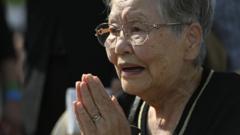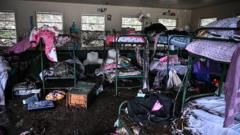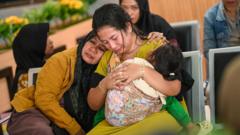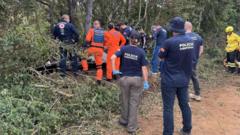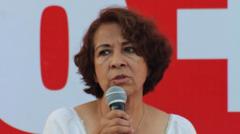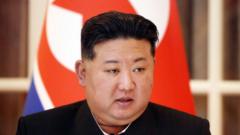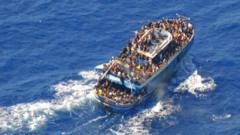Nagasaki marked the 80th anniversary of the atomic bombing with a poignant ceremony, where Mayor Shiro Suzuki urged the world to halt escalating conflicts that could lead to nuclear war. The events on August 9, 1945, which claimed over 74,000 lives, are a solemn reminder of the destructive power of nuclear weapons.
Nagasaki Remembers: A Call for Peace on 80th Anniversary of Atomic Bombing

Nagasaki Remembers: A Call for Peace on 80th Anniversary of Atomic Bombing
Nagasaki's mayor emphasizes the urgent need to prevent nuclear conflict as the city commemorates its tragic history.
In a heartfelt gathering, Nagasaki Mayor Shiro Suzuki underscored the importance of peace and global harmony during the ceremony commemorating the 80th anniversary of the atomic bombing on August 9, 1945. Speaking to attendees who gathered in remembrance, he expressed concern over the intensifying global conflicts, stating, "If we continue on this trajectory, we will end up thrusting ourselves into a nuclear war."
The bombing, which occurred in the final days of World War II, resulted in an immediate death toll of approximately 74,000, with many survivors suffering severe aftermaths from radiation. The ceremony included a moment of silence, along with a poignant symbol of mourning: participants, including survivors, offered water—symbolizing the desperate pleas of victims who suffered horrific burns and thirst after the blast.
Shiro Suzuki reflected on the fragility of peace, urging world leaders to cease physical confrontations, stating, "Immediately cease from disputes in which 'force is met with force'." The event also served as a stark reminder of ongoing global conflicts, particularly in light of wars involving Russia, Ukraine, and the Israel-Hamas situation.
Amidst contrasting views on nuclear weapons, Suzuki reaffirmed the commitment of Nagasaki to peace, inviting representatives from various nations, including previously shunned countries. As debates over nuclear disarmament continue, the spirit of remembrance in Nagasaki stands as a strong plea for a safer future free from the shadows of atomic warfare.
The voices of survivors, such as 93-year-old Hiroshi Nishioka, added a personal dimension to the stark historical narrative, recounting the horrific experiences of that day, and reminding attendees of the ongoing impact of nuclear warfare. The day concluded with a hopeful message, emphasizing that remembering the past is key to preventing future tragedies.
The bombing, which occurred in the final days of World War II, resulted in an immediate death toll of approximately 74,000, with many survivors suffering severe aftermaths from radiation. The ceremony included a moment of silence, along with a poignant symbol of mourning: participants, including survivors, offered water—symbolizing the desperate pleas of victims who suffered horrific burns and thirst after the blast.
Shiro Suzuki reflected on the fragility of peace, urging world leaders to cease physical confrontations, stating, "Immediately cease from disputes in which 'force is met with force'." The event also served as a stark reminder of ongoing global conflicts, particularly in light of wars involving Russia, Ukraine, and the Israel-Hamas situation.
Amidst contrasting views on nuclear weapons, Suzuki reaffirmed the commitment of Nagasaki to peace, inviting representatives from various nations, including previously shunned countries. As debates over nuclear disarmament continue, the spirit of remembrance in Nagasaki stands as a strong plea for a safer future free from the shadows of atomic warfare.
The voices of survivors, such as 93-year-old Hiroshi Nishioka, added a personal dimension to the stark historical narrative, recounting the horrific experiences of that day, and reminding attendees of the ongoing impact of nuclear warfare. The day concluded with a hopeful message, emphasizing that remembering the past is key to preventing future tragedies.

